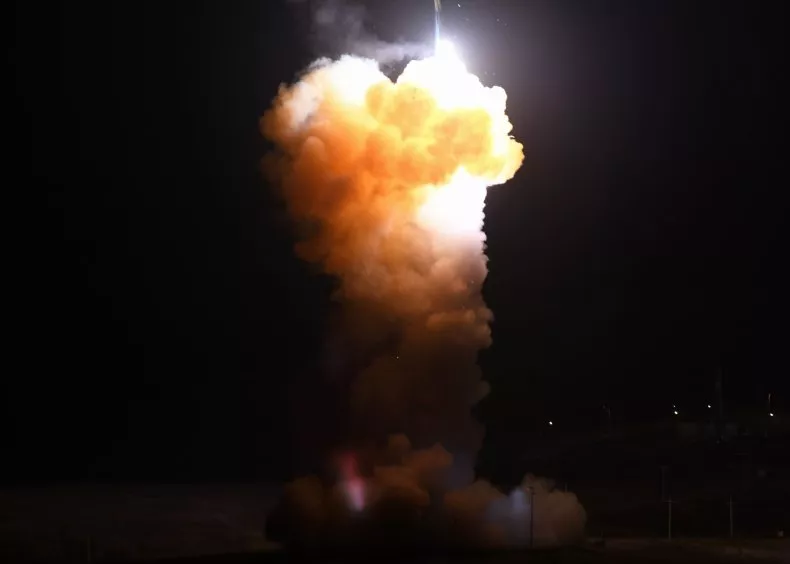The U.S. military test launched an unarmed yet nuclear-capable intercontinental ballistic missile on the night of the election.
At 11:01 p.m. Pacific Time on Nov. 5, the Minuteman III intercontinental ballistic missile (ICBM), equipped with multiple targetable re-entry vehicles, was fired from the Vandenberg Space Force Base in California to the U.S. military’s Ronald Reagan Ballistic Missile Defense Test Site in the Marshall Islands, southeast of Japan.
The U.S. Space Force said in a statement the launch was part of a routine test that occurs three times a year, and is “intended to demonstrate that the United States’ nuclear deterrent is safe, secure, reliable, and effective to deter 21st century threats and reassure our allies.”
The last Minuteman III ICBM test launch occurred on June 6.
“This Minuteman III test launch exemplified the mission readiness, agility, and professionalism of the personnel at Vandenberg, Global Strike Command, and the U.S. Navy,” said Col. Dorian Hatcher, Space Launch Delta 30 deputy commander.
“Every test of this deterrent system at Vandenberg underscores the nations robust capabilities and highlights the indispensable support our Airmen and Guardians provide to ensure national security.”
The Space Force stated that such tests have occurred more than 300 times before and the latest launch was “not the result of current world events.”
The test occurred days after North Korea test launched an ICBM on Oct. 31, which reached a record altitude with a flight-time of 87 minutes—the longest ballistic missile test ever conducted by the totalitarian regime.
And on Sept. 25, Beijing test-fired an ICBM into the South Pacific—the first test by the Chinese Communist Party (CCP) in 44 years since 1980, raising concerns among Pacific leaders.
Gen. Thomas A. Bussiere, commander of Air Force Global Strike Command, added that the tests demonstrate U.S. preparedness to defend its interests and allies.
“These tests are demonstrative of what Striker Airmen bring to the fight if called by the president,” he said. “An airborne launch validates the survivability of our ICBMs, which serve as the strategic backstop of our nation’s defense and defense of allies and partners.”
Tony Xia, a military expert and commentator, said the tests serve as deterrence for the new “axis of evil”—China, North Korea, Russia, and Iran.
“The Minuteman III ICBM launched from the ground is the most fundamental component of the United States’ nuclear triad and also the fastest-reacting nuclear strike force,” he told The Epoch Times.
“Its flight speed exceeds 20 Mach, which means that even when launching an attack from thousands of kilometers away, the opponent has only a few minutes to respond. Coupled with its multiple warhead reentry capability, it puts immense pressure on adversaries, leaving almost no target immune.”
Xia said the United States’ continued capabilities are critical to regional stability given the efforts by the CCP, Russia, and North Korea to develop their nuclear weapons capabilities and their recent series of ICBM tests.
“The United States, the West, and all peace-loving nations around the world do not wish to see a new nuclear arms race,” he said. “However, the CCP, Russia, North Korea, and now Iran all violate international treaties by developing or expanding nuclear arsenals, posing a significant threat to global security.”
In contrast to North Korea, which has been conducting ballistic missile tests and nuclear weapons development in violation of U.N. Security Council resolutions, the United States is a recognized nuclear-weapons state under the Nuclear Non-Proliferation Treaty (NPT).
Xia said that the Minuteman III missile is set to be replaced by the more advanced LGM-35 Sentinel, also known as the Ground Based Strategic Deterrent, by the late 2030s.
“However, the demonstration of nuclear strike capability by the Minuteman III still holds strong deterrent power,” he said.













